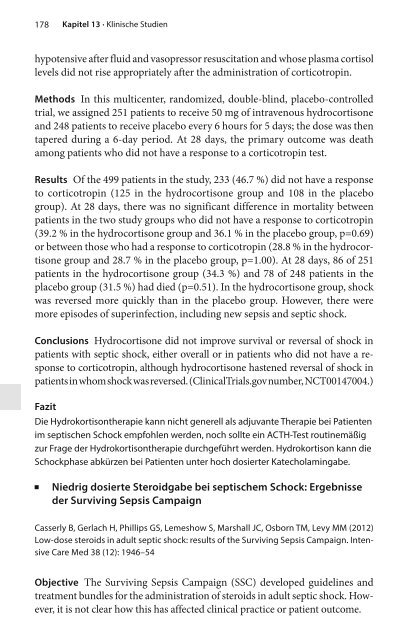Intensivmedizin Fragen und Antworten
Sie wollen auch ein ePaper? Erhöhen Sie die Reichweite Ihrer Titel.
YUMPU macht aus Druck-PDFs automatisch weboptimierte ePaper, die Google liebt.
178 Kapitel 13 · Klinische Studien<br />
hypotensive after fluid and vasopressor resuscitation and whose plasma cortisol<br />
levels did not rise appropriately after the administration of corticotropin.<br />
Methods In this multicenter, randomized, double-blind, placebo-controlled<br />
trial, we assigned 251 patients to receive 50 mg of intravenous hydrocortisone<br />
and 248 patients to receive placebo every 6 hours for 5 days; the dose was then<br />
tapered during a 6-day period. At 28 days, the primary outcome was death<br />
among patients who did not have a response to a corticotropin test.<br />
Results Of the 499 patients in the study, 233 (46.7 %) did not have a response<br />
to corticotropin (125 in the hydrocortisone group and 108 in the placebo<br />
group). At 28 days, there was no significant difference in mortality between<br />
patients in the two study groups who did not have a response to corticotropin<br />
(39.2 % in the hydrocortisone group and 36.1 % in the placebo group, p=0.69)<br />
or between those who had a response to corticotropin (28.8 % in the hydrocortisone<br />
group and 28.7 % in the placebo group, p=1.00). At 28 days, 86 of 251<br />
patients in the hydrocortisone group (34.3 %) and 78 of 248 patients in the<br />
placebo group (31.5 %) had died (p=0.51). In the hydrocortisone group, shock<br />
was reversed more quickly than in the placebo group. However, there were<br />
more episodes of superinfection, including new sepsis and septic shock.<br />
Conclusions Hydrocortisone did not improve survival or reversal of shock in<br />
patients with septic shock, either overall or in patients who did not have a response<br />
to corticotropin, although hydrocortisone hastened reversal of shock in<br />
patients in whom shock was reversed. (ClinicalTrials.gov number, NCT00147004.)<br />
Fazit<br />
Die Hydrokortisontherapie kann nicht generell als adjuvante Therapie bei Patienten<br />
im septischen Schock empfohlen werden, noch sollte ein ACTH-Test routinemäßig<br />
zur Frage der Hydrokortisontherapie durchgeführt werden. Hydrokortison kann die<br />
Schockphase abkürzen bei Patienten unter hoch dosierter Katecholamingabe.<br />
jNiedrig dosierte Steroidgabe bei septischem Schock: Ergebnisse<br />
der Surviving Sepsis Campaign<br />
Casserly B, Gerlach H, Phillips GS, Lemeshow S, Marshall JC, Osborn TM, Levy MM (2012)<br />
Low-dose steroids in adult septic shock: results of the Surviving Sepsis Campaign. Intensive<br />
Care Med 38 (12): 1946–54<br />
Objective The Surviving Sepsis Campaign (SSC) developed guidelines and<br />
treatment b<strong>und</strong>les for the administration of steroids in adult septic shock. However,<br />
it is not clear how this has affected clinical practice or patient outcome.


